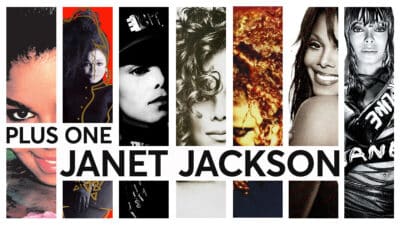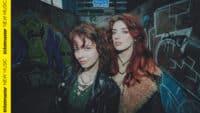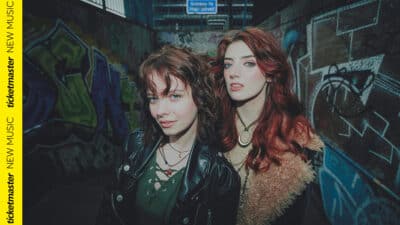Theatre
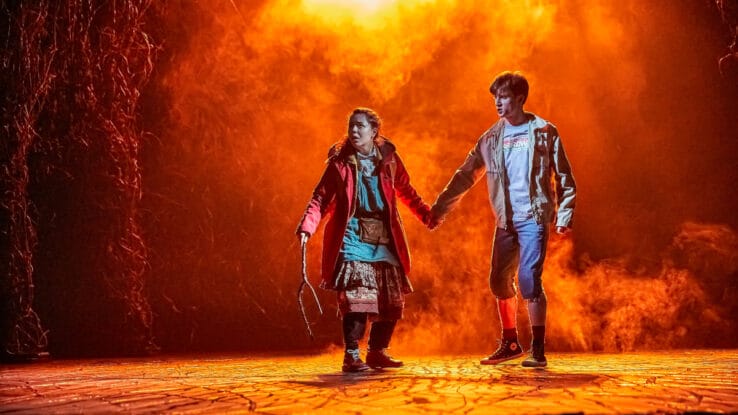
Interview
The making of The Ocean At The End Of The Lane
The cast of the critically acclaimed Neil Gaiman adaptation tell us how the magic is made
Why do children imagine things that scare them?
“Imagination’s a way to escape when you’re a kid,” says Millie Hikasa. “It’s the one thing you know how to do, whether you’re standing in a playground and the floor is lava, or just creating stories in your head. I think it’s a way to just escape from everything else that’s around you. Like when you’re at school, you don’t want to think about school, so you think about other things and read books – you want to live things or do things that aren’t necessarily within the world that you’re living in.”
“It’s the unknown,” Daniel Cornish adds. “It’s creating answers to questions that you don’t know the answers to. And I think a lot of the time, it’s a protective thing.”
The two are part of the leading cast of The Ocean At The End Of The Lane, The National Theatre’s adaptation of Neil Gaiman’s sci-fi/fantasy epic. Now in its second West End run, the production has dazzled audiences and critics alike, earning an astounding number of five-star reviews, and bringing first-time theatregoers in droves.
“I know what people take away from that because they come and tell me,” says Trevor Fox, who plays Dad. “They’ve had this wonderful night in the theatre, and they’ve seen something that was totally unexpected. When we were playing Newcastle, a lot of my family came, and my family don’t really go to the theatre very much. But a lot of them came to see this. My two nephews – one of them’s 16, and one of them’s 22 – both of them said the same thing. ‘I didn’t know theatre could be like that. I didn’t know that’s what it was.’”
Fox’s Dad is the father of the Boy, the show’s central figure, played by Kier Ogilvy, with Daniel Cornish as alternate. Also in their family is Sis, played by Laurie Ogden. The three of them are archetypes: the sensitive older child, aching after the loss of his mother, the annoying younger sister, craving female role models, and the emotionally repressed father, struggling to do the right thing.
Around this dented nuclear family creeps a much less typical, much more complex world. There are the mysterious Hempstocks, a three-generational family of women who stand guard over Boy each in different ways. There’s Old Mrs Hempstock (Finty Williams), her daughter Mrs Hempstock (Kemi-Bo Jacobs), and her granddaughter, Lettie (Millie Hikasa). Attempting to defy their rule is the insidious Ursula, played by Charlie Brooks. They all share the stage with a hypnotic ensemble, along with the puppets, illusions and other magical creations that bring the world of The Ocean At The End Of The Lane to life. We caught up with the cast at the Nöel Coward Theatre to unpack why this production has captured the hearts and minds of audiences so completely.
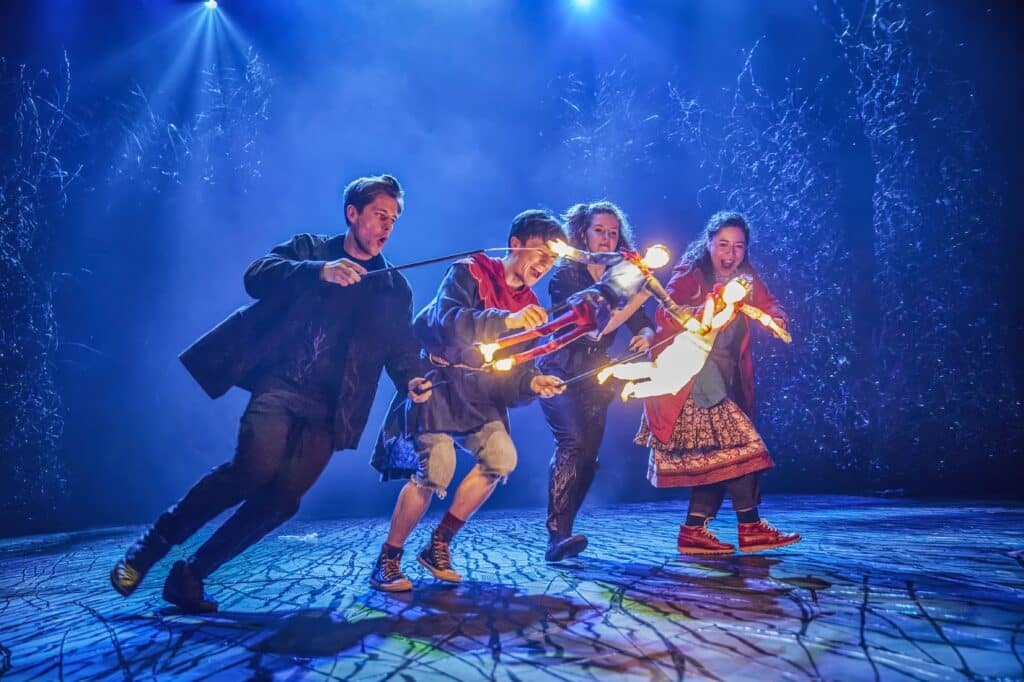
What drew you to this story?
Finty Williams: I had seen it in the West End, my son had seen it at the National and in the West End. And I came to see it not knowing that it was ever going to happen again. I loved the fact that it was this fantastical piece of theatre, but at the heart of it, there was a really solid good story. And that it’s a story without an agenda. It’s just a proper story that you sit down when you’re a child at bedtime and listen to.
Kemi-Bo Jacobs: I knew Neil Gaiman, but I didn’t know about this book. When I read the script for the first time, I think I was just really drawn into the magic and the imagination of this slightly bonkers world. I had never read or been asked to read for anything like that on stage before. And that was really compelling. Certainly, as a performer, you want to be invited to try things outside of your comfort zone. And then when I learned more about the project and did a day’s workshop, and the idea there was movement and puppetry involved, I just thought, “This is really exciting. I haven’t done anything like this before”.
Were you imaginative children?
Kier Ogilvy: Yeah, for sure. I feel really old when I talk to people even three years younger than me, because we got Sky when I was like, 12 or 13, and so when I was growing up, there was nothing to do. The reason I can do accents is because we would entertain ourselves doing voices. When I was cast in the role, it felt familiar, because I was so anxious, and I was always imagining the worst possibility. So, a lot of playing the Boy is just remembering that.
Trevor Fox: I was born in the mid 60s, so I grew up in the 1960s and the 1970s. I’m staying with a friend now in London that I grew up with in the Northeast of England. I was obsessed as a kid with boarding school. I come from a working-class family, I went to a comprehensive school – I couldn’t be further away from boarding schools. But I was obsessed with books such as A Little Princess. I had this vague idea that I was living in this working-class family in Newcastle when, really, I should have been living in a stately home.
Millie Hikasa: I grew up as technology was pretty much starting to come into play, but I still remember playing on the playground and going to the park and playing with friends. I think with the world of technology, all that has changed a lot. To be able to show that onstage – even just the show itself, to be able to do the puppets and the elements that we do without animation or CGI or without technology, just people moving it and people physically embodying the story – also shows that element of imagination.
Laurie Ogden: I had a hugely overactive imagination. And I read a lot of books, especially fantasy books. I read books that were a bit above my age grade, so I did have a lot of nightmares. I didn’t have a specific fear, but whenever it was dark or late at night, that’s when my imagination would go wild. I relate to the Boy quite a lot in that way.
Charlie Brooks: I had a period of my life where my brother slept in my room with me for a whole year because I thought I was seeing a ghost. I think we’d probably recognise it now more as a sort of anxiety. I think what’s so interesting about this play is it marries the domestic life with this fantasy fictional world so beautifully. It really makes you think about your childhood, and how you remember things – what was true and what wasn’t. Because I didn’t know if it was real or if it wasn’t, or if I was just a little bit scared of life, or whatever that might have been. But I needed my brother there for comfort for a whole year.
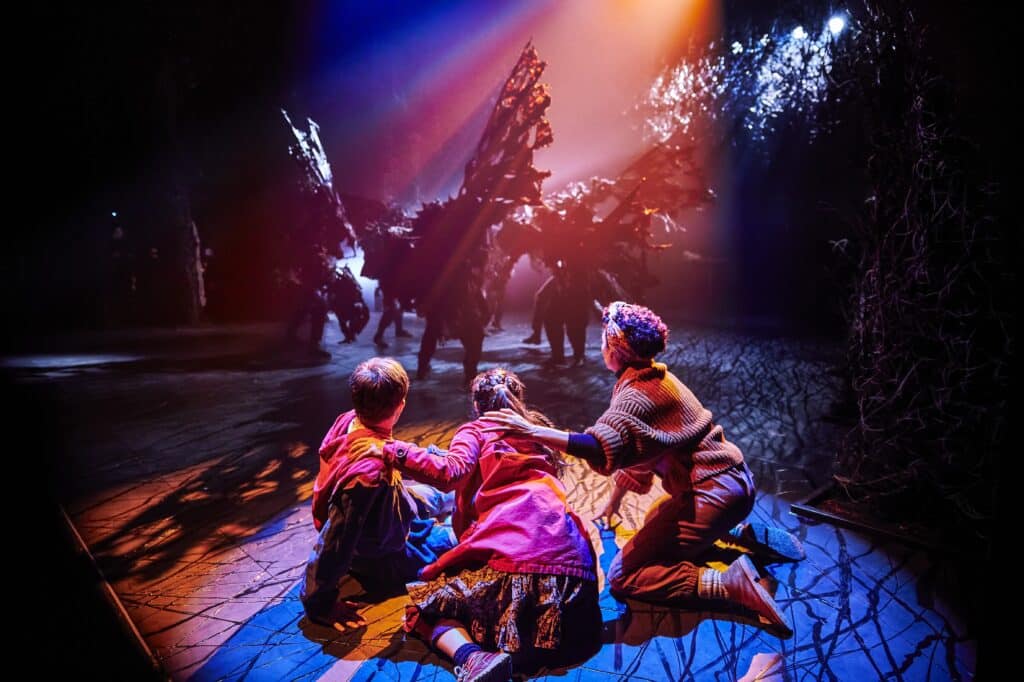
How did you react when you were first introduced to some of the ‘magic’ of this show?
Daniel Cornish: It was quite interesting. We had six weeks of rehearsals…
Millie Hikasa: …And we didn’t see much. The only things we really saw were the big puppets. The first time we saw those magical pieces and the set was during tech. For us, it was this magical surprise as well.
Daniel Cornish: A lot of the conversations would be like this. We’d all be in rehearsals and our amazing creatives would go, “So this is what’s gonna happen now.” And we’d all sort of go, “Huh?” And they’d be like, “No, seriously, we’ve done this twice. This is what’s gonna happen, and more.” And it wasn’t until we got to tech rehearsals that we actually saw it come together.
This show requires a lot of precision and a lot of really detailed choreography, especially in the ensemble. How did you find that aspect of it?
Laurie Ogden: A couple of the sequences took a really long time to learn, because with illusions, precision is so important. But we had an incredible creative team leading us through it, who were very patient with all of us.
Charlie Brooks: Repetition was key. You just do something and you do it again. And you do it again. Our head illusionist would teach us and he’d go, “Right, now you’re going to do that 10 times back to back.”
Finty Williams: I’d never done anything like this before. So I came in on the first day of rehearsals wearing high heeled boots and very quickly found out that it was three weeks of intense physical theatre. All the movement has been re-conceived or re-choreographed for this production. So it was a lot of, “Take this stick and make it into an obstacle.” I was tired after 10 minutes. I was like, “My imagination’s done,” and there’s all these people around me being brilliant. And then it was, “Now get in a plank and hold it for a count of 30.” And I was shaking. It really tough. But then it got easier. However I felt about it did not diminish my respect, in any way, shape or form, for the rest of the people. I was so full of respect that I went home and said to my boyfriend, “I’m never going to speak to any of them.” Because they were just brilliant.
Daniel Cornish: The ensemble are incredible, the ones that move the set and all the pieces. They inhabit the world that we’ve created. It’s like having an imaginary friend, it’s got that element to it. It’s amazing that even though they don’t have speaking parts, once you give them a personality and a relationship to the other characters, you just get drawn into the story even more. I think it becomes a bit more personal.
Millie Hikasa: They create the world of the show. Without them, I don’t think atmosphere that’s created on stage would be the same.
Have any of the illusions ever not quite worked on stage?
Charlie Brooks: I mean, yes, due to my own human error, where I had a mind blank and went through the wrong door. I also fell through one of the illusions on stage, which kind of made the scene finish a little earlier than it should have.
Laurie Ogden: We’ve had lots of silly things as well, like milk falling on the floor and teapots smashing, but it’s just getting creative with how we solve it and keep the show going. And I think, touch wood, audiences haven’t noticed when things have gone wrong. Apart from the teapot…
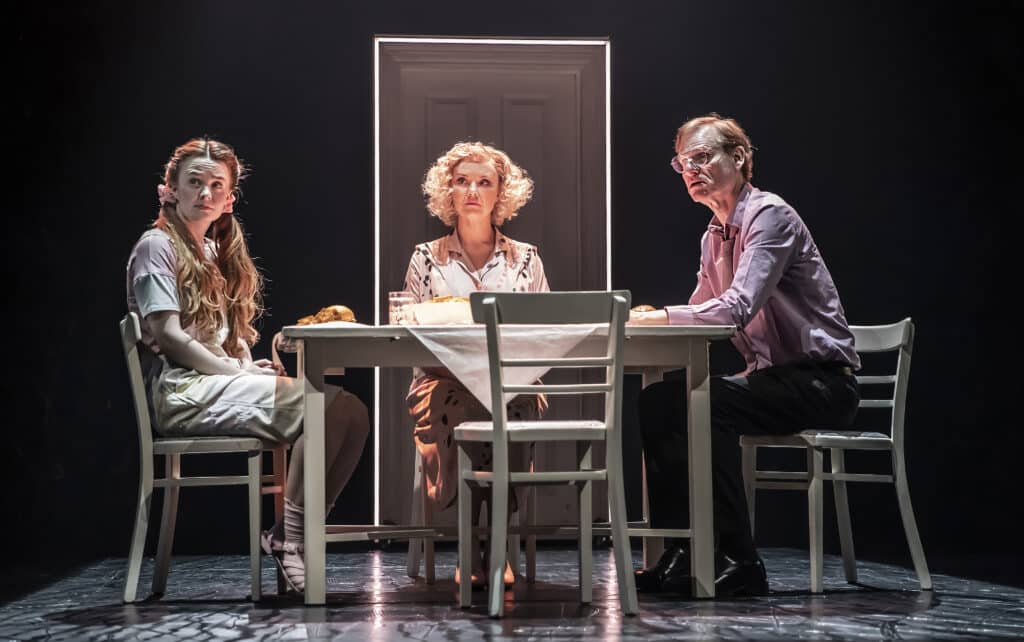
Why do you think so many people relate to Dad and Boy’s relationship?
Kier Ogilvy: It’s a funny one, because as an adult reading the script, or as an adult being in it, you can see that the dad is just looking for some kind of intimacy; that he is doing his best, he’s dealing with a tough situation. He has lost his wife, his kids have lost their mum. In the 80s, it was a lot more gendered. So he’s being presented with certain problems that he would not be expected to have to understand. But as a child, you don’t read that. You just read your dad doesn’t understand you, which means you’re a problem. And I suppose that’s it. All of the imperfections of parents are read by children as: they’re the culprit.
Trevor Fox: The older I get and the more people I meet, I’ve realised that boys seem to have problems with their dads, and women seem to have problems with their mums. Those relationships always seem the most complicated. I don’t know why.
There is a moment in the play where the Dad takes things too far in a conflict, and there’s some uncertainty as to whether he’s being controlled by an external force or not. How do you view that moment?
Trevor Fox: We talked a lot about that. In the script, and I believe in the book, Neil Gaiman certainly wanted to emphasise that he wasn’t being controlled; it was the Dad who had just lost it and reverted into what his dad was. We talked a lot about it in rehearsal, because in a book, things are easier to put across than they are in play. You’ve got a lot more time and you’ve got much more description. I think when you talk to different people, they take different things from it. It’s obviously, as an actor, a very difficult place to go to.
The relationship between Sis and Boy is a complicated one that doesn’t seem to have a clear resolution. How do you see their relationship?
Laurie Ogden: It’s not neatly packaged up because it’s sibling love. And that is never constantly harmonious. And I think the things that they’ve been through together probably mean that they’re slightly more bitey with each other. But I do think that at their cores they do love each other – they’re just kids getting at each other.
What makes the Hempstocks as a family so inviting?
Finty Williams: If you take away all the magic, I think it’s a family that people can relate to. There’s a mother who’s trying to be practical and say “just be careful,” and then there’s a grandmother going, “no, go on, do it anyway,” and there’s a child who’s pushing the boundaries of what they should be allowed to do. I think you can look at it and see those normal family dynamics, the same with Boy and Dad and Sis. I think that was one of the reasons why Neil Gaiman didn’t name them, was because he wanted people to be able to insert themselves into that dynamic.
Kemi-Bo Jacobs: There’s something wonderfully naive about that world, particularly when you look at it juxtaposed to the world of Boy, Dad and Sis, where they feel very much in the contemporary, in the present. And there’s something unadulterated about the Hempstocks, quite pure. There are no gadgets – it’s very kind of wholesome and rustic. And I think for many of us, we kind of want that simplicity with a family where we’re just together, eating soup and homemade bread, being able to sit one another’s company without speaking, but yet being in community. And there’s something about that, I think, that really endears people to their family. There is something, I suppose, nostalgic about it. We don’t know how long they’ve existed. They’re definitely not from this world.
Do you see the Hempstocks as gods?
Finty Williams: Neil Gaiman deals a lot with the triple goddesses, which I stopped talking about after a while. Not because I don’t believe in it, but just because of the description is “the Maid, the Mother and the Crone”. So I get Crone… You can’t dress that up very well! But I love the thought of these three extraordinarily powerful women who sort of circle the Boy with their wisdom, that received wisdom.
Kemi-Bo Jacobs: We did explore that, certainly, when we were rehearsing and doing some research. Also the Fates. The idea that they are timeless, they’re kind of omnipresent. But we don’t dwell too much on that. We definitely want to root them in the present. But they are goddesses, I think, yeah.
Finty Williams: And there’s also that thinking of, are they three separate entities? Or are they one being? Which I think is quite interesting. I know quite a lot of my friends who’ve come to see it have all got different opinions about whether they are three separate people.
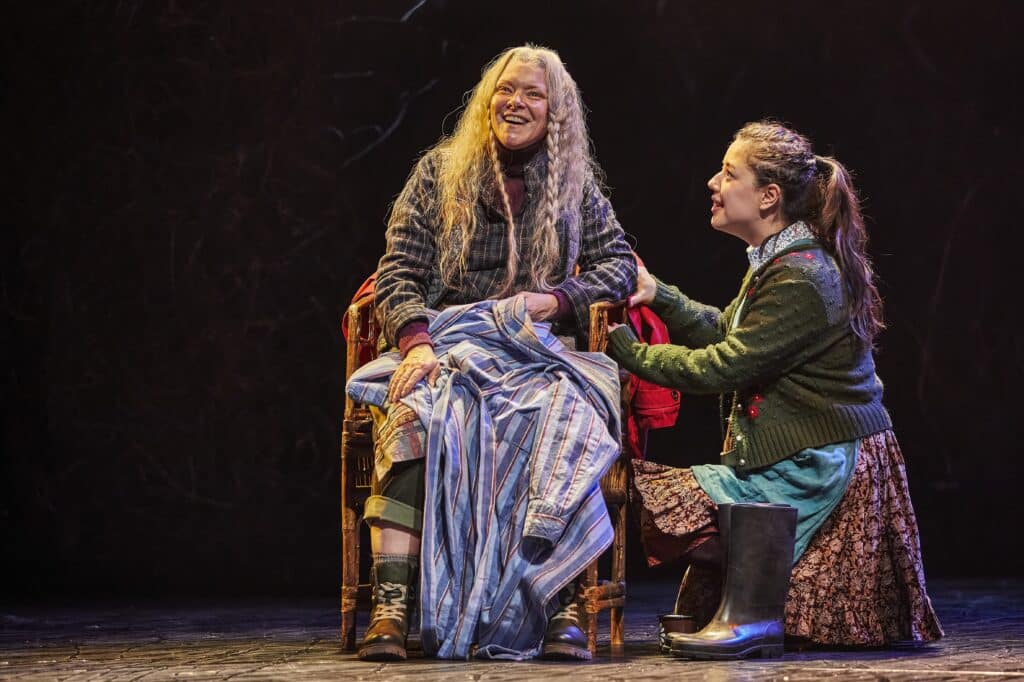
What makes Ursula such a compelling villain?
Charlie Brooks: I think, with any good villain, and I’ve played one or two, it’s about getting underneath their skin and finding out what it is they really want. And being sympathetic towards them in some way. Continuing to try and nail the very innocent, friendly, lovely kind of woman that she is makes it more haunting when we know that she’s not that. And that’s quite a challenging and tricky space to navigate.
Laurie Ogden: I think it’s her ability to switch from this warm, loving character to something terrifying. She’s filling a void in the family space that needs to be filled for Dad and for Sis, it’s just that she comes with her own needs.
What makes this show special?
Daniel Cornish: What’s been so wonderful is for a lot of people, this has been their first time coming to the theatre. And I think what’s been so great about taking it around the UK as well is that we’ve been able to take something as spectacular as this to different cities. It’s a reminder of how important theatre is, and how important going to see theatre is.
Millie Hikasa: To be able to sort of tap into the child that is, I think, inside everyone inevitably, is so fun, and to be able to do it every night is really fun. And then to get to do it alongside the Boy… it’s just like being on an adventure that you’ve always wanted to go on. The people I know that have seen it are like, “Oh my god, it just makes me want to play again”.
Charlie Brooks: I love shows that are thought provoking. I hope that it ignites conversations between older people and younger people about family dynamics, about the universe, about what they’re afraid of.
Laurie Ogden: I want people to come away from it just excited by possibility of theatre. This show really is a love letter to theatre. I want people to feel moved by the relationships in the show and the power of empathy, the power of friendship, of being different and embracing who you are.





